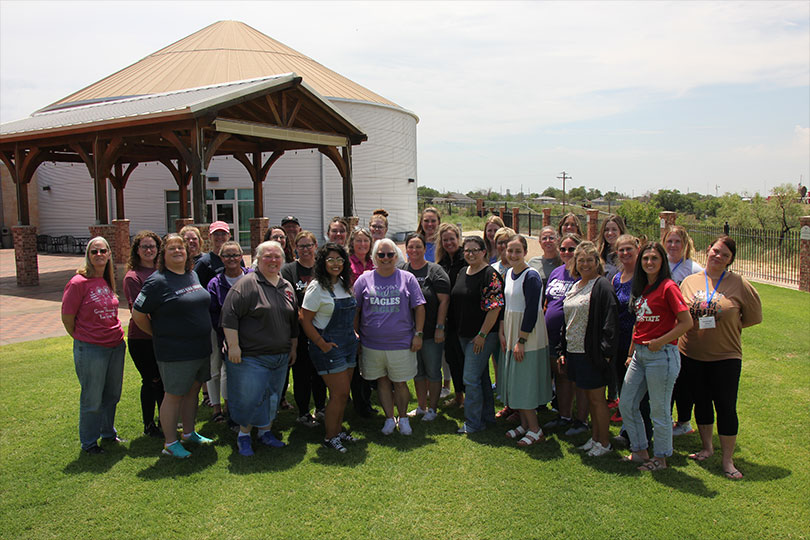By Shelby Shank
Field Editor
Texas teachers learned more about agriculture and how they can incorporate agriculture into their classrooms at this year’s second Texas Farm Bureau (TFB) Summer Ag Institute in Lubbock.
This was the first time to host the educational workshop in Lubbock.
During the four-day professional development event, teachers toured farms, ranches and agribusinesses in West Texas. Educators heard from industry professionals, educational experts and participated in hands-on activities they can replicate in their classrooms.
“Summer Ag Institute provides an interactive, hands-on learning experience for educators to gain a better understanding of agriculture and how to incorporate it into their teaching,” said Jordan Bartels, TFB associate director of Organization Division, Educational Outreach. “This was the first year expanding the program to Lubbock and teachers toured farms and ranches in West Texas to learn about agriculture and explore ways to integrate it into their classroom lessons and activities.”
Farm, ranch tours
Educators toured Back to Nature Compost in Slaton. The company supplies bagged cotton burr composts and blends to the lawn and garden industry.
Teachers visited USDA ARS Cropping System Lab in Lubbock and learned about the current studies being conducted at the research center.
At Bayer, teachers learned how they treat cottonseed. Over half of the cottonseed planted in the United States is processed at the Bayer Lubbock Texas Cottonseed Manufacturing site. There, the seed is tested, processed and distributed to dealers across the cotton belt for farmers to plant.
A trip to the FiberMax Center for Discovery in Lubbock left educators more informed about the region’s agricultural heritage. The museum showcases a collection of historic farm structures, both indoor and outdoor.
Participants also visited the National Ranching Heritage Center in Lubbock and Adelphos Cellars in Lorenzo.
Hands-on workshops, activities
During the Summer Ag Institute, industry experts and fellow teachers facilitated activities and lessons the educators can bring back to their classrooms.
Michelle Coker, a high school teacher at Central Heights ISD, gave a group lesson over DNA extraction where participants evaluated genotypes and phenotypes of cattle.
Dr. Scott Longing, an associate professor of entomology at Texas Tech University, led a workshop on how teachers can integrate entomology in the classroom with their students.
In a session with Texas Tech Quail, teachers saw research being conducted using micro radio transmitters to study chick movement and habitat use data. The group also learned about a bobwhite’s life from egg to adulthood.
Educators heard from the National Ranching Heritage Center about resources available to use alongside Hank the Cowdog books.
Teachers also learned more about educational resources and professional development opportunities available through TFB.
Teacher experiences
Educators from urban and rural areas enjoyed the immersive experience.
“I was shocked at how many of these things I did not know about, and I live 10 minutes from them,” Laura Scott, a fifth-grade math and science teacher at Wheelock Elementary School, said about local agricultural resources.
Agriculture starts on farms and ranches, but it happens in the classroom, too.
“Science is all around us. Sometimes it’s really obvious, and sometimes it takes a little thinking. I like that the materials weren’t presented as curriculum, but it was really how can you fit this into what you are already doing,” Scott said. “I have to give kids experiences because that is going to make the difference between understanding and not understanding.”
Scott believes in introducing her students to different experiences to help them form connections.
“Some of our students don’t have the same life experiences as other students. In science, that makes a huge difference,” she said. “I can have a question that mentions a safety pin, and a student may not be able to answer the question because they’ve never touched a safety pin. They may see a picture of it, but touching a safety pin and feeling it are two different things.”
She was really excited to see the lessons were TEKS aligned and easy to incorporate into her classroom.
“I was looking at all of this through a lens of how we can make real life connections to what we’re already teaching,” Scott said. “We don’t have time for extra lessons. Our timeline is so tight, and for us to be able to incorporate anything, we have to have it tied to a TEKS.”
Scott plans to bring back what she learned and create an additional resource for the teachers at her school to help bring agriculture and TFB resources to more educators.
About the event
The event took place July 16-19 in Lubbock.
The Summer Ag Institute in Waco was held June 10-13.
For more information on TFB’s Ag in the Classroom efforts, visit texasfarmbureau.org/aitc.


Leave A Comment